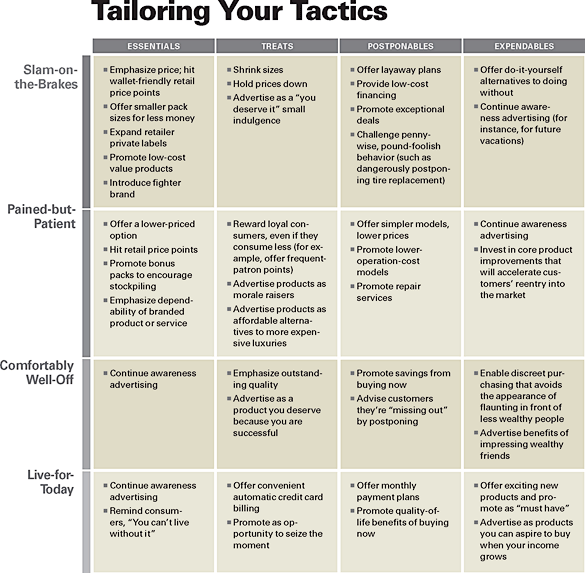2020 was a shocker to the world. The earth was literally at a standstill with all economic activities halted globally to tackle the novel coronavirus to prevent a global catastrophe.
Fast forward to 2022, countries are beginning to recover, but then the war in Ukraine breaks out having a strong economic impact across Europe, America, and even Africa. The world is now facing another crisis, with the economy plummeting and inflation going over the roof across different countries.
But what do all of these mean to you as a business owner, how does it affect the running and marketing of your business?
The Reality of an Economic Crisis
Just like everyone, businesses are not spared from the harsh caprices of a hailing economy.
During an economic crisis, customer demands for goods and services drop exponentially, many businesses shut down, others lay off employees, fewer jobs are available, etc. This means that you may have a hard time making sales, having a profit, and keeping your business afloat.
But there are ways to navigate through such situations successfully with the right strategies and tactics. As we saw with companies like Apple, Google, banks, etc. they not only came out of the covid-19 pandemic but they have also gone ahead to record growth post the pandemic.
This is because they were able to adapt and change as needed, which is what you need to do as well.
How to Navigate a Business through an Economic Crisis
Successfully running and operating a business during an economic crisis is no easy task, but there are key steps that can be taken to help you navigate these tough times.
- Understand the situation.
- Understand the psychology of the customer.
- Understand the value of your product or service.
- Understand how important marketing how it can help you navigate a crisis.
- Manage cash flow.
- Stay flexible, etc.
1. Understand the Situation
The first step in navigating any crisis is to understand the situation. You need to know how bad things are, where the problems lie and what kind of impact you can expect on your business. If it’s a financial crisis, this means understanding how much debt you have as a company and how much cash flow will be available to meet obligations.
2. Understand the Psychology of your Customers During the Crisis
If you want to operate a successful business, you must understand your target audience’s psychology. The better you understand your audience’s mindset and needs, the more likely you are to succeed in selling them your product or service.
Having said this, it is important to note that the psychology and buying behavior of your customers before, during, and after an economic crisis differs. Therefore marketing a business successfully to your customer during an economic crisis requires a re-evaluation of their current psychology.
According to a brilliant segmentation done by two Harvard professors (John Quelch and Katherine E. Jocz), customers can be categorized into these four segments during an economic crisis.
- The slam-on-the-brakes segment: Feeling most vulnerable and hardest hit financially, this group reduces all types of spending by eliminating, postponing, or substituting for purchases. Although this consumer segment is often made up of lower-income consumers, anxious higher-income consumers can also be part of its market.
- Pained-but-patient consumers: This segment comprises consumers who tend to be resilient and optimistic about the long term, although less confident of their ability to maintain their standard of living in the near term. Like slam-on-the-brakes consumers, they economize in all areas, though less aggressively.
- Comfortably well-off consumers: This segment of consumers feel secure about their ability to ride out the ups and downs of crisis, so they continue spending at near-prerecession levels on products that meet their basic needs. They do tend to be more selective (and less conspicuous) than before when making these purchases, however.
- The segment consists primarily of people in the top 5% income bracket. It also includes those who are less wealthy but feel confident about the stability of their finances.
- The live-for-today segment: Despite the economic downturn, this group continues to live as it always has and is not concerned about saving money. The consumers in this group respond mainly by delaying major purchases they had otherwise been planning to make. Typically urban and younger, they spend on experiences rather than stuff (except for consumer electronics). They’re unlikely to change their consumption behavior unless they become unemployed.
3. Re-evaluate your Value Offering
A value offering is what you give to your customers in exchange for their money. It’s the reason people buy from you instead of your competitors.
During an economic crisis, the different consumer segments prioritize consumption by sorting products and services into four categories:
- Essentials are necessary for survival or perceived as central to well-being.
- Treats are indulgences whose immediate purchase is considered justifiable.
- Postponables are needed or desired items whose purchase can be reasonably put off.
- Expendables are perceived as unnecessary or unjustifiable.
What category does your value proposition fall under?
During an economic crisis, consumers tend to shift their spending away from treats, postpones, and expendables and tend to focus more on essentials. This means that if you offer a value offering that’s perceived as essential for survival or well-being, you have a better chance of being immune to the effects of the crisis. In a case where you do not, you might want to tailor your solution to address more essential needs.
Marketing to these different segments of customers will require different unique marketing techniques based on your value offering and your consumer’s needs.

4. Don’t Cut down on Marketing
This may sound counterintuitive, but an economic crisis is not a time when you want to cut down on your marketing efforts. Rather, it is a time to optimize your marketing. I’ll explain.
While most companies will be cutting down on their marketing during an economic crisis, they are leaving a space that you can fill by targeting these customers that have been left in limbo. The key is to not just market to these customers, but also provide value. If you can help them through the crisis by giving them advice or information on how to get through it, then they will be more likely to remember your company when things are back to normal.
Marketing is not just about advertising and getting the word out about your products and services; it’s more than that. It’s about building relationships with customers over time—and those relationships are important not just for now, but for years to come as well.
5. Manage the cash flow properly
Managing the cash flow of your business is vital to its success. Cash flow is not just about money coming in; it also covers how much money you spend each month to run your business. If you overspend, then this will have an impact on your profits as well as on your credit rating if you end up going into debt with suppliers or others who provide goods or services to you such as printers or advertising agencies.
As a result of this, cash flow management should be one of the most important aspects of running a successful business whether times are good or bad in terms of economic conditions because it can mean the difference between going under and staying afloat during difficult economic times.
6. Automate Business Activities
Automation is important in a crisis because it allows you to focus on other things. It also helps save time and money, and it improves efficiency. Automating repetitive tasks in your business can help you get more done with less work which means more time for other important activities. Automation can be as simple as using a spreadsheet to track your finances or as complex as programming an app to do the same thing.
7. Network and Partner

While your business might be going through tough times due to an economic crisis, it is important to note that you are not alone in this space, other businesses are most likely facing similar issues, and more than ever, they are more open to strategic partnerships.
That is why it is important to network and collaborate with other businesses in your industry. Doing this will help you find out if there are any companies out there that might be able to help you solve your problem and it can also provide you with a new perspective on how things work within the industry.
8. Stay Flexible
It is important to note that there are no clear-cut solutions to a business crisis. This is why it is important to remain flexible and adaptable to find the best solution. There might be times when you need to make drastic changes or decisions, while other situations require more subtle actions.
To remain flexible, you should always be thinking about how things might change and what your options are. This will help you stay ahead of the curve and ensure that you are ready for any eventuality.
9. Measure and Track Activities
With a clear plan in place, you can begin the process of tracking and measuring your activities to ensure that they’re working.
- Track and measure all of your activities. It’s important to track everything that is happening regularly so you know how much time and money are going where. Even though this might seem like an obvious step, it’s surprising how many businesses don’t keep track of what they’re doing regularly. They’ll be lucky if they have data from when they first started their business (if even then).
- Measure results. You need to measure the results from each activity so you can learn which ones are working well and which need improvement or even elimination! Just because an activity turned out well doesn’t mean it was effective—but if something didn’t work at all, then no sense in continuing with it!
- Eliminate non-working activities right away; try new approaches with working ones until they reach their limits; perfect them as much as possible afterward before adding anything else new into your repertoire!
Other Key Activities to Implement
Empathize with Customers
During an economic crisis, instead of ramping up prices for consumers, you must bolster trust by empathizing with them and being a part of the solution. During a recession, consumers are more price sensitive than ever before. As such, your business needs to be able to offer competitive prices. One way to ensure this is by partnering with suppliers who have access to lower-cost materials or services that can help you keep costs down. Another approach is by reducing your expenses and streamlining operations so that they are more efficient and less costly.
You can also provide discount offers during this period. For example, as seen amongst online learning platforms like Coursera, Edx, etc. during the covid-19 pandemic, they provided a free course on pandemics to users. This helped them retain their user base, and gain new users, while also providing an opportunity to collect data on these users. In turn, this information can be used to improve the quality of future courses and better serve their students.
Seek Help from Professionals
If you are unsure of what the best course of action is, you can always seek help from professionals. For example, a marketing agency can assist in developing strategies to attract new users by optimizing effective copywriting that appeals to their needs, and through platforms like social media. A business development expert will help you design a solution that will help you create value for yourself and your customer. An accountant willgive you advice on how to reduce your costs and make more money. They can also help you with the financial side of things, such as how to ensure that your company is profitable.
Focus on the positive and move with time
When the going gets tough, the tough get going.
It’s easy to get caught up in the negativity of an economic crisis, but you must focus on the positive and move with time. Don’t be afraid to make mistakes – even if they are big ones! Don’t be afraid to try new things or fail at them either. And most importantly don’t be afraid to succeed and show others what you can do too! Never let fear stop you from achieving your dreams.
Conclusion
The economic crisis is a reality that we have to deal with. It can be an opportunity for businesses to grow and get ahead of the competition, but only if we are prepared to deal with it effectively. Businesses need to re-evaluate their value offering, focus on existing customers first, manage cash flow properly and create an effective communication system before anything else. The most important thing is not to panic and stay flexible in terms of managing resources as well as time allocation.



